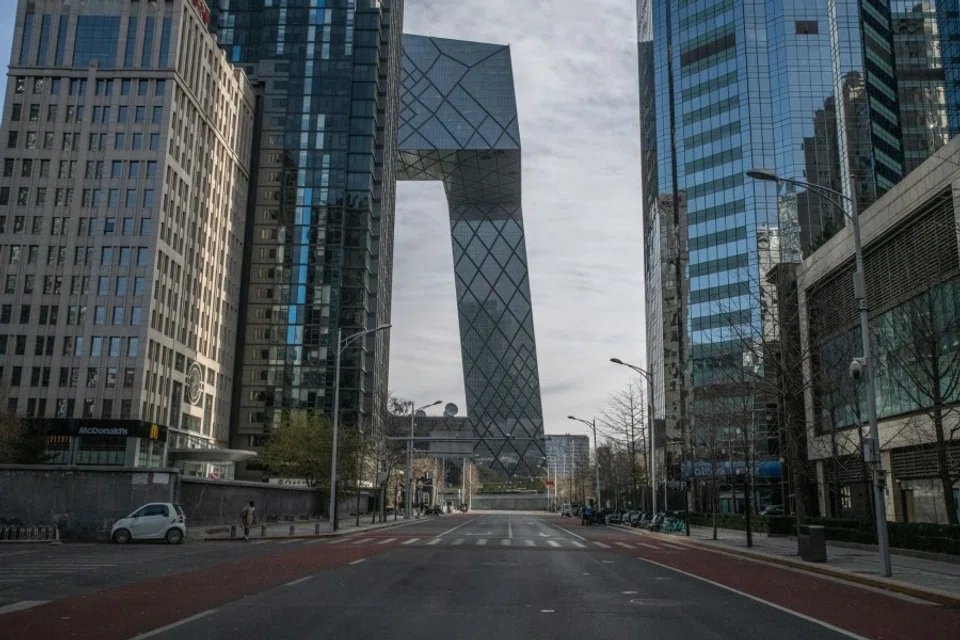China is facing a harsh economic winter
Commentator Chen Kuohsiang notes that even after the 20th Party Congress and talks between Chinese and US Presidents Xi Jinping and Joe Biden during the G20 summit, the Chinese economy is not facing an easy time, not least because of Covid-19 controls, the US's trade restrictions and China's stringent policy on private enterprises.

A month after the 20th Party Congress of the Chinese Communist Party (CCP), Chinese President Xi Jinping met with US President Joe Biden on 14 November. The two events have significantly reduced the uncertainty surrounding mainland China's economy.
For one thing, China's economic path and environment over the short term remain unchanged. Market forces will continue to weaken, international and domestic capital will continue to leave, and the industrial supply chain will tend to fragment and move out. In short, the spectre of a China economic crisis is growing.
No easing of market controls
The Hong Kong stock market - the bellwether of China's economy - has fallen sharply to new lows and has not recovered lost ground, while the mainland's three main stock indices remain less than motivated. Interestingly, the poor performance was not due to market concern over changes in the CCP's economic governance, but the belief that the controls over the market will be ramped up.
The economic reality after the 20th Party Congress is one of domestic and external dilemmas - the domestic economy continues to slide, while the international environment is getting increasingly tough.
There has been some easing of the strict Covid-19 controls that have hampered economic growth over the past few years, but they remain fundamentally unchanged. Indeed, production has been suppressed - the zero-Covid policy led to forced partial closures and the suspension of production lines at Foxconn's Zhengzhou factory that manufactures high-end Apple phones, with its November revenue falling 11.4% year-on-year. Production and industrial chains have relocated as a result, much to the benefit of India and Vietnam.
These policies severely hinder companies' independent growth and skew the effective distribution of resources, leading to weak drivers of economic growth.

The slowdown in China's economic growth is evident. Since reform and opening up in 1978, China's economy has maintained at least 9% annual growth; however, growth in the first three quarters of 2022 came at 4.8%, 0.4%, and 3.9% respectively, averaging 3% and projected at less than 3% for the whole year. While the drop in growth is due to the impact of Covid-19 controls and the war in Ukraine, Xi's economic policy direction also has a part to play.
In recent years, the CCP has not embraced the market as warmly as Deng Xiaoping did; on the contrary, it has interfered with the market to ensure "orderly growth", and made government investments the main driver of the economy, especially in key industries. These policies severely hinder companies' independent growth and skew the effective distribution of resources, leading to weak drivers of economic growth.
Before the 20th Party Congress, the industrial sector within and outside of China looked forward to a correction of such left-leaning economics, but those hopes have been dashed. It is indeed hard for the business environment to return to the hands of the market, which makes it a challenge to boost competitiveness.
Also, with the difficulty of executing a U-turn of the Covid-19 policy, it is hard for the property bubble to recover despite property sector aid. And with policies and finances favouring state enterprises, debt ratio of companies and local governments exceeding 200% of GDP, and an ageing population, an economic recovery to pre-pandemic levels is almost impossible.
Outflow of foreign capital
The decline of China's economy has grown increasingly evident and is difficult to reverse under the policy direction that has been in place for the past decade.
Many economists within and outside of China believe that with the slowdown in the country's economic growth, as well as international technological curbs and reduced investments, there will be a change in the direction of growth since reform and opening up - from expanding outwards to focusing on internal growth, and domestic circulation overtaking external circulation.
But apart from easing diplomatic relations, the same could not be said for economic relations - the chokehold on China's technology has not abated, and the shift towards decoupling continues.
The 20th Party Congress report urgently called for more attention towards national security and reducing external dependence, with Xi further committing to self-reliance in the technology sector. But following the session, the idea of dual circulation seems to have taken a battering as the economy has continued to weaken.

The talks between Biden and Xi during the G20 summit had eased tensions and set up red lines to prevent relations from cracking and slipping into conflict, with both sides agreeing to follow-ups by senior officials. But apart from easing diplomatic relations, the same could not be said for economic relations - the chokehold on China's technology has not abated, and the shift towards decoupling continues.
Neither side mentioned measures to reverse worsening economic relations, nor addressed the US's ban on selling advanced chips to China; on the contrary, Biden criticised China's "non-market economic practices, which harm American workers and families". It seems that China's economy is set to be pressured by the US for some time to come.
There has also been a rapid outflow of foreign capital this year, as massive US public pension funds from several states have stopped or withdrawn from investing in China, and manufacturers continue to leave. The withdrawal of capital and manufacturing has worsened economic relations between both countries, hitting China's economic development and industrial transformation hard.
The American Chamber of Commerce in Shanghai found in its latest survey that nearly twice as many US companies cut their investment in China this year compared with last year, while one-sixth of respondents are considering withdrawing from China altogether.
The Financial Times reported in November that BlackRock, the world's largest asset manager, has shelved the launch of a significant China bond exchange-traded fund "amid growing tensions between Washington and Beijing and a reversal in the gap between Chinese and US yields".
... the local governments can hardly save themselves.
Multiple economic storms
Some academics assessed that China is currently facing multiple economic storms. The situation is worsening and there is no effective solution in sight amid the business closures and corporate layoffs, massive unemployment, decreased consumption, declining foreign trade and shrinking surplus, plunging stock markets, financial disorder, fiscal deficits and severe local government debt, the exodus of foreign enterprises and capital, and the depreciation of the RMB. The Chinese economic decline is bound to continue.

The previous practice of relying on state infrastructure investment to boost domestic demand is no longer effective, as local government coffers have been threatened by plunging land sales and soaring Covid-related expenditures - the local governments can hardly save themselves.
Statistics from the Chinese finance ministry show that in the first half of the year, China's 31 provinces, municipalities and autonomous regions were all running fiscal deficits, with Shanghai's fiscal deficit running as high as 1.8 billion RMB (US$251 million). How will the government find more cash to save the economy?
China is facing a harsh economic winter mainly due to the government's tightening grip on the private sector since last year, where regulatory crackdowns have targeted the country's booming industries such as after-school tutoring, gaming, entertainment, and the hardest hit property sector. At the same time, tech giants such as Alibaba, Tencent, Didi Chuxing and ByteDance have also been punished and fined to prevent the disorderly expansion of capital and monopolistic practices.
"... But pluck all of them and only the vine remains." - Tang poem
While these actions restrain and deter the innovative private sector, they also provide the bureaucratic state-owned enterprises with more room to expand. Nonetheless, the economy is further damaged as the pandemic lockdowns severely disrupt business production and operations.

This situation reminds one of the Tang dynasty poem Huang Tai Gua Ci (《黄台瓜辞》), written during the reign of Emperor Gaozong of Tang when dynastic affairs were essentially handled by the wildly ambitious Empress Wu Zetian. She had deposed crown prince Li Zhong to make Li Hong crown prince, only to have Li Hong poisoned later and replaced by Li Xian.
Constantly worried and in distress, Li Xian wrote the poem Huang Tai Gua Ci: "A melon seed was planted below Huang Tai. Several melons will grow on the vine during the harvest season. Pluck one and the remaining melons can thrive. Pluck another and the vine seems bare. Pluck three and there may still be some melons left. But pluck all of them and only the vine remains."
Related: Can China save its property market and economy amid fastest-spreading outbreak to date? | Inflation under control in China, but rising pork prices says otherwise | Will an investment summit revive Hong Kong's status as a financial hub? | China's overreliance on land finance could lead to its downfall | CCP new leadership team's big task: Build market confidence amid zero-Covid | Export slowdown reveals cracks in one of China's economic pillars



![[Photos] Fact versus fiction: The portrayal of WWII anti-Japanese martyrs in Taiwan](https://cassette.sphdigital.com.sg/image/thinkchina/3494f8bd481870f7c65b881fd21a3fd733f573f23232376e39c532a2c7593cbc)

